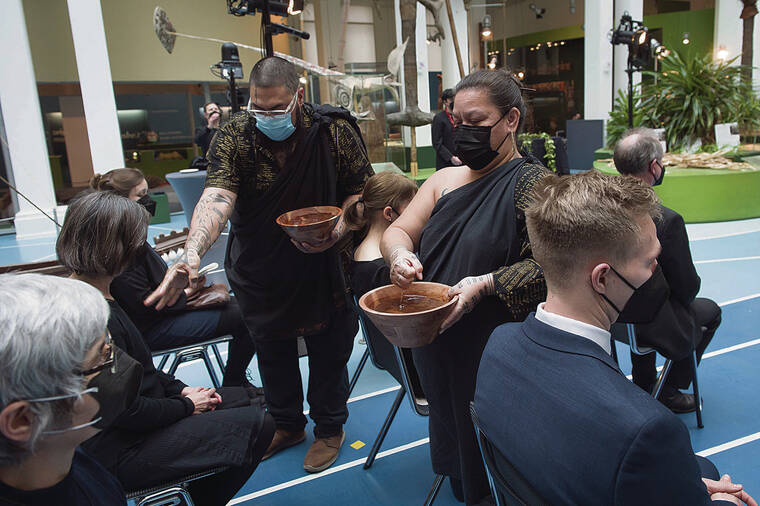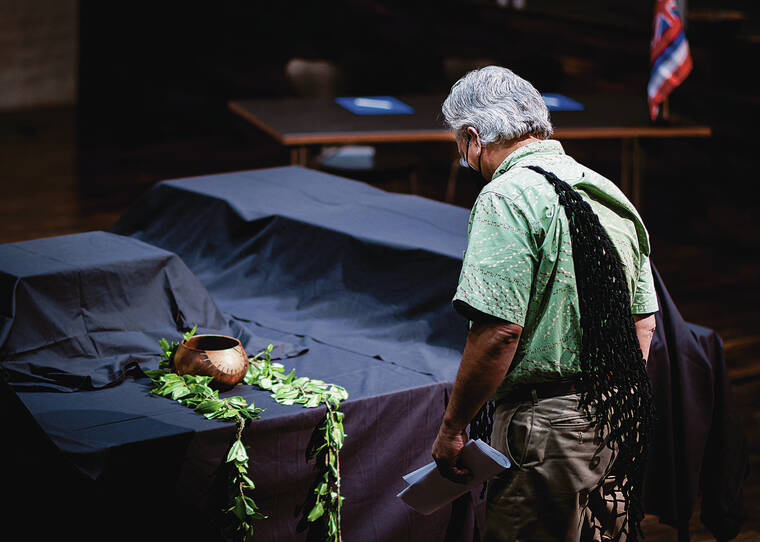An Office of Hawaiian Affairs delegation has returned home 58 iwi kupuna after completing a five-city trip to Germany and Austria. The repatriation of the Hawaiian skeletal remains, which the agency said were stolen from Hawaii more than 100 years ago, is seen by many as an act of healing and fulfillment of a kuleana.
“It’s not only healing past injustices … but it’s healing our ancestors because they were never meant to be objectified or taken away from their places of rest,” said Kamakana Ferreira, OHA’s lead compliance specialist, who helped to plan and oversee the repatriation trip.
“It also helps to heal us as Native Hawaiians. We have a kuleana to protect our ancestors. There are a lot of family members that when iwi are removed, they feel partly responsible because they weren’t able to stop it. In enabling this act of repatriation, we’re able to fulfill our kuleana to put our ancestors back to rest.”
The trip, which was funded by donations and other out-of-pocket expenses covered by delegation members Edward Halealoha Ayau, Kalehua Caceres and Mana Caceres, began Feb. 8 with the first stop at the Ubersee-Museum Bremen in Germany. Eight ancestral remains were handed over at a ceremony with museum and other officials.
The delegation also collected 13 remains from the University of Gottingen, three from the Friedrich Schiller University Jena, 32 from the Berlin State Museums of the Prussian Cultural Heritage Foundation and two from the Natural History Museum Vienna in Austria.
>> PHOTOS: Germany to return ancestral remains to Hawaii
>> RELATED: OHA delegation travels to Germany to bring home ancestral remains
When the iwi kupuna returned home Wednesday, Ferreira said they were given to community leaders and representatives from Kauai, Molokai, Maui and Hawaii island, which is where the remains were originally taken from, to be reburied.
“It’s very rewarding,” Ferreira said. “We’ve been appreciative of the institutions. They’re also embracing their own humanity and coming to terms with colonial pasts when they participate in these repatriation events. Everybody was able to make it happen.”
Iwi kupuna are considered critical to Native Hawaiians’ identity. Protecting iwi kupuna is seen as crucial for the spirit of the deceased to rest in peace and for their descendants to prosper. These Hawaiian ancestral remains were taken unlawfully during colonialism and without the consent of family members, OHA said.
Ferreira said the process from when OHA files a repatriation claim to retrieval can vary from years to months. The agency has to coordinate with the institutions, verify its holdings, submit claims, conduct research, answer questions and then work with the U.S. embassies, he said.
He added that OHA is planning another trip this year to retrieve more iwi kupuna from five to six institutions in Paris, Northern Ireland, Scotland and Germany. Ferreira’s team is also working on other iwi kupuna claims on the mainland and in Hawaii.
The trips are part of OHA’s efforts, which are included in its strategic plan, to protect and care for iwi kupuna. In 2021 the agency provided $167,298 in one-year grants to four community organizations as part of its iwi kupuna repatriation plans. This was the first time OHA had dedicated a funding stream specifically for iwi kupuna repatriation and education. The agency plans to budget $300,000 this year for more iwi kupuna grants.
Although planning for repatriation can be challenging, Ferreira said it’s worth it.
“I’ve been to a lot of these reburial ceremonies,” he said. “There are a lot of tears but also a lot of joy and happiness.”
———
Jayna Omaye covers ethnic and cultural affairs and is a corps member of Report for America, a national service organization that places journalists in local newsrooms to report on undercovered issues and communities.








